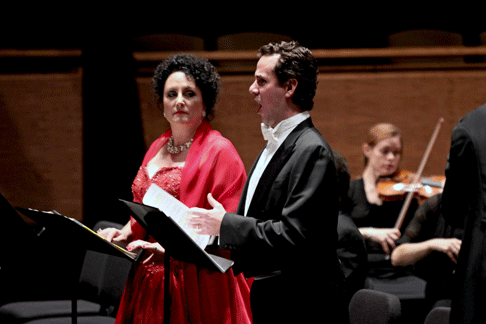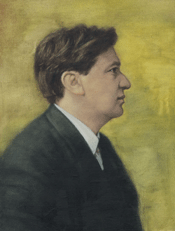When
Italy and Germany went to war, his career languished, and his music has not
endured — perhaps because his most notorious work, the brief, comic
Segreto di Susanna, arouses modern prejudices: it’s a hymn to
the joys of cigarette addiction. Or perhaps it’s because he never quite
settled on a single style, and his tuneful, professional operas do not fit into
any easy category.
I Gioielli della Madonna (The Jewels of the Madonna), a story of
passion, sacrilege and madness among superstitious Neapolitan hoi
polloi, composed in 1911, is Wolf-Ferrari’s sole contribution to the
Verismo genre. It was quite popular in its day, especially in Chicago, where
the great Polish soprano Rosa Raisa made it a celebrated vehicle. Maria Jeritza
(and, later, Florence Easton) triumphed in it at the Met, in an all-out
superspectacular production in 1926 with street scenes in anthropological
detail, giving the snooty Times reviewer the chance to condemn its vulgarity in
a group with Cavalleria Rusticana and Tosca — names
unlikely to deter opera fans today. On the strength of the excellent concert
performance presented by Teatro Grattacielo at Rose Hall last Monday,
Wolf-Ferrari might be worthy of more attention, though there are few Raisas or
Jeritzas around today who could do the role of Maliella justice.
Wolf-Ferrari’s gifts for depicting character with melody, his skill at
taut plotting and abrupt turns from festival to horror were rather greater in
his youth than were evidenced in the much later Sly, when the Met
produced that dreary vehicle a few years back. As a composer, Wolf-Ferrari is
not so much of the manner of such contemporaries as Giordano and Montemezzi as
a harkener back to the melody of Ponchielli, Boito and the young Mascagni. If
the crowd scene that opens I Gioielli takes a lot of time (and would
cost a fortune to stage — peddlers, street kids, folk making the evening
passaggio, the full panoply of local color) and the orgy in the den of
brigands in Act III goes on for rather a bit, there is always a pleasing
tunefulness to pass the time. Too, the composer has the orchestral skill for
not one but two intermezzi and a ballet — though I did not find them as
evocative as Mascagni’s or Ponchielli’s.
The story was devised by the composer, probably after being fleeced during a
Neapolitan vacation. Venetians are reluctant to admit that Neapolitans belong
to the same nationality as themselves, and the Camorra, who figure loudly in
the opera, are still the real rulers of the city.
 Photo by David Samsky
Photo by David Samsky
Gennaro is lustfully obsessed with young, arrogant Maliella. As Maliella, a
girl of low birth, has been raised as his foster sister, she finds his
possessive attitude grotesque; she is attracted to the sexy local Camorra boss,
Rafaele, who offers her anything she likes — even the jewels that adorn
the wonder-working local statue of the Madonna, Queen of Heaven. Of course
Maliella would never ask such a sacrilegious gift, and even Rafaele
wouldn’t really steal them, but she tosses the offer in Gennaro’s
face — and he, maddened, does just that, decorating the girl with the
stolen jewels and using her shock (and her lust aroused by a duet with Rafaele)
to seduce her. Now that she’s damaged goods, Rafaele, who has boasted of
her virginity, no longer wants her and the Camorra are horrified by the
accusation they will surely receive when the theft is discovered. Maliella
drowns herself. Gennaro goes mad, prays for repentance, and stabs himself in
religious ecstasy — yes, this is another opera composed in the era of
turn-of-the-century Catholic revival (Suor Angelica, Le Jongleur
de Notre Dame) where the Madonna makes a climactic, fatal appearance.
There is no one to like very much in this story, and its erstwhile
popularity may be credited in part to the audiences’ cheerful contempt
for the superstitious lower orders. In an earlier era, Mozart’s
Bastien und Bastienne and Bellini’s La Sonnambula
tickled sophisticates with tales of naïve peasant love — how happy we
might be if we were as poor and simple as they! In the Verismo era of
Cavalleria Rusticana, Tiefland and I Gioielli della
Madonna, the pitying sneer was again not unmixed with envy: we’re
too civilized to believe in the miraculous or to avenge betrayal with blood,
but aren’t these peasants passionate? Wouldn’t it be nice if we
could feel like those simple folk? Among later works in a similar strain, one
can think of Kurt Weill’s Threepenny Opera (in which German
lowlifes paraded their passions for a cheerfully shocked bourgeoisie),
Gershwin’s Porgy and Bess and Bernstein’s West Side
Story. This patronizing attitude has not died out. Why should it?
Sophisticates who have no intention of renouncing their sophisticated
privileges, love to think they bear a burden.
For the Grattacielo performance, Julia Kierstine wore a red spangled gown as
loud as, well, Rosa Raisa — she was fun to watch. Her voice had the heft
and the lyric lilt for sexy Maliella, but the annoying quality of singing
around rather than precisely on the pitches. I did not get the sense (which the
composer clearly wished to convey) of a flaunting but naïve sexpot, and am not
sure if it was her technique or the melody that failed. Kierstine did better
with the sensuous duet in Act II (which does not get pornographically out of
hand because the composer has cleverly put a locked and barred garden gate
between the two passionately lusting lovers), and the brief Verismo mad scene
that accompanies her seduction at the act’s climax.
Joshua Benaim tossed off Rafaele’s addresses with the proper casual
and sexy address — one believed in the sincerity of his passion for
Maliella — until he finds she’s no longer a virgin, and discards
her in disgust. Benaim has a sturdy, well-focused, slightly rough-edged
baritone, and he cleverly makes use of its roughness to display the nastier
sides of Rafaele’s personality, barking the lines in disgust in contrast
to his elegant phrasing of serenade and yearning duet. He is a gifted,
intelligent singer, and Italian opera of this era rewards that sort of
skill.
Raúl Melo sang the tormented role of Gennaro with fervor that never
interfered with an attractive lyric line. Gennaro is rather a one-note
character until his final magnificent scene of repentance and suicide, and the
character is not a pretty one, but the quality of Melo’s singing kept us
eager to have him return, to hear what he would give us next.
Eugenie Grünewald sang Gennaro’s mother Carmela with the right broad
and earthy spaciousness, not unmixed with an unfortunate wobble. The many small
roles were cast with Teatro Grattacielo’s usual expertise.
David Wroe, the company’s music director, kept impressively on top of
this elaborate score, which his large orchestra, enormous chorus (on the rear
tiers of the hall), mandolins for local color (not overdone, thank you Maestro
Wolf-Ferrari), and expert children’s chorus performed with great panache
until the final slightly uneven pianissimo. There was even a mime for one
intermezzo and four dancers for the orgiastic ballet — capable no doubt,
but for me the least interesting part of the night; I kept my eyes closed to
focus on the music-making.
Rose Hall is not enormous and the acoustic varies greatly — I found my
seats in the front orchestra awkward due the brassy explosions of the opening
scene, the balances much better from the rear of the section for the other
acts. A loud, elaborate orchestration calls for sitting farther back — as
in any hall.
John Yohalem

